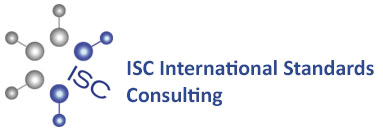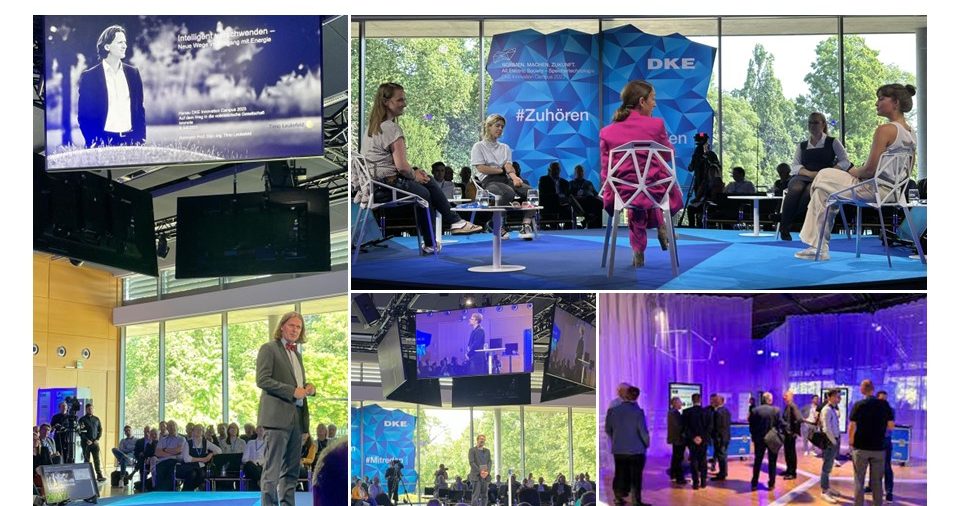“To implement the vision of an All Electric Society, comprehensive electrification, digitization, and automation of all sectors are necessary: industry, buildings, transportation, infrastructure, and energy – as well as the comprehensive data networking and coupling of energy supply based on international standards,” said Michael Teigeler (Managing Director of DKE).
This energy needs to be transported to where it is needed, and surpluses need to be stored to be available when the sun is not shining and the wind turbines are not turning. In this spirit, this year’s DKE Innovation Campus was held under the motto “NORMS. MAKING. FUTURE. All Electric Society – Energy Storage Technologies.”
The event took place on July 4, 2023, at the Hanau Congress Center and brought together more than 600 experts and stakeholders from various fields to discuss the future of energy supply and technological innovations. Over half of the participants were present in person and took advantage from the morning “Business Breakfast” to the evening “Get Together,” as well as the information booths at the “DKE Digital Workshop” for personal conversations.
DKE was represented in particular by Dr. Kurt Bettenhausen (DKE President), Michael Teigeler (DKE Managing Director), and Florian Spiteller (Member of the DKE Management Board), who explained the DKE’s vision of an All Electric Society. It is a vision in which electrical energy is made available everywhere as a easily transportable and primary form of energy. A concept that converts it into other energy carriers, such as hydrogen, where it makes sense.
The event was moderated by Andrea Thilo, a well-known journalist and presenter. She guided the day and led the discussions with the invited guests.
These guests included Lea Dohm (co-initiator of Psychologists for Future), Susanne Schöb (CRITICAL FRIENDS), Josephine Schwenke (Initiative Last Generation), Juliane Selle (VDE Young Net), and Darya Sotoodeh (Fridays for Future). Together with moderator Andrea Thilo, they discussed in the first panel (People, what have you done?) topics and challenges in the field of energy supply and climate protection. This discussion round is remarkable because it demonstrates how committed DKE is to involve all interested parties from science, industry, politics, and various associations in their work.
Following the discussions, Prof. Dipl.-Ing. Timo Leukefeld, known as the Energy Ambassador, delivered a keynote address on Intelligent wasting – New approaches to energy management. He presented innovative approaches and solutions for more efficient energy consumption.
Another keynote speech was given by Anna Katharina Meyer the (United Sustainability Group and Member of the Presidium of the Club of Rome Germany). She spoke about energy storage systems in the context of the transformation of the energy regime and highlighted how they can contribute to sustainable energy supply.
Florian Spiteller and Athina Savvidis (DKE) introduced the All Electric Society and explained the steps already being taken to realize the vision of a society without fossil fuels.
The keynote speeches were followed by a series of impulse presentations. Thomas Timke (SOLARWATT GmbH) spoke about standards related to batteries, Birgit Haller (OLI Systems GmbH) presented innovative projects in the field of feasibility, and Dr. Georg Angenendt (CTO of Accure Battery Intelligence) explained the future prospects of battery technology.
Following that, the DKE Digital Workshop was opened, providing participants with the opportunity to learn about innovative technologies and solutions firsthand. During the lunch break, participants could further explore the Digital Workshop and engage in discussions with other attendees.
In the afternoon, parallel workshops were held to delve into specific topics: Second life of batteries, Environmental aspects / Recycling of batteries, grid integration, Integrating hydrogen into the power grid, Redispatch 3.0, Bidirectional charging and E-Mobility, Battery passport and digital product passport, All Electric Society – Status and the idea of a new digital standardization roadmap, and Battery repairability. In these interactive workshops, participants could deepen their knowledge and actively contribute.
Following the workshops, the closing impulse speech of the event was delivered by Prof. Dr. Nicole Deitelhoff, a renowned political scientist. She spoke about the societal implications of electrification and encouraged further discussions.
Another highlight of the day was the fishbowl discussion on the topic Society. Power. All Electric Society. How do we electrify society? In this discussion format, Dr. Kurt Bettenhausen, Dr. Britta Buchholz, Prof. Dr. Nicole Deitelhoff, Dr. Annette Frederiksen, Prof. Dipl.-Ing. Timo Leukefeld, Susanne Schöb, and Alf Henryk Wulf sat together and engaged in lively discussions about the societal challenges related to the energy transition.
The DKE Innovation Campus 2023 concluded with an AI-supported closing and was followed by a relaxed “Get Together” session.
Overall, the DKE Innovation Campus 2023 was an inspiring and informative day that provided participants with new perspectives and solutions in the field of energy technology and sustainability. The diverse keynotes, impulse presentations, workshops, and discussions reflected the broad engagement and interest of the participants, who are committed to a sustainable and innovative future.
About DKE: The German Commission for Electrical, Electronic & Information Technologies of DIN and VDE (DKE) is the national organization responsible for the development of standards and safety regulations in the field of electrical engineering, electronics, and information technology in Germany. Further, the DKE is the German member of the International Electrotechnical Commission (IEC) and the European Committee for Electrotechnical Standardization (CENELEC). In this capacity, DKE is responsible for a large number of secretariats in the aforementioned standardization organizations. This includes the IEC TC 113 Nanotechnology for electrotechnical products and systems and the corresponding reporting secretariat SR 113 at CENELEC. The work results of DKE are an integral part of the German standards system and form the VDE regulations as well.

